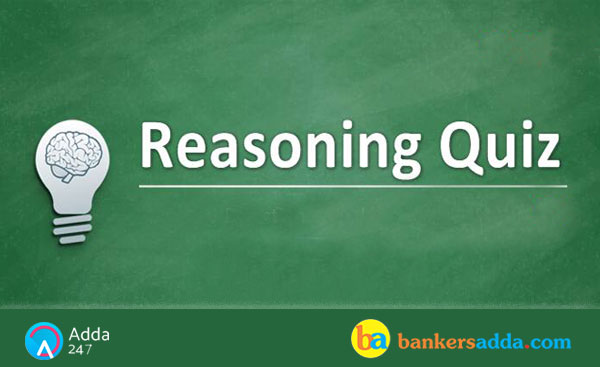
Directions (1-5): Study the following information carefully and answer the questions given below:
Eight persons, A, B, C, D, E, F, G, and H are sitting in a straight line (but not necessarily in the same order.) Three of them are facing south and rests are facing opposite direction. They like different colours i.e. Red, Green, Blue, Black, Pink, Brown, yellow, and White (not necessarily in same order). Four persons sit between H and E who likes brown. F sits right of C, who likes yellow colour. G and E face opposite direction to each other. The one who sits immediate right of D likes white. B sits third from the extreme end of the row. H sits 3rd right of C. The one who likes blue sits immediate right of the one who likes green. C doesn’t face north direction. G is an immediate neighbor of C and E both. B faces south direction. D sits 2nd to the right of G. C sits immediate left of B. The one who likes red sits at extreme end. The one who likes black sits between E and A. F does not like blue colour.
Q1. Who among the following is second to the left of the one who likes black colour?
Q2. Who among the following sits at the ends of the rows?
Q3. Who among the following sits third to the left of E?
Q4. What is the position of the one who likes green colour with respect to C?
Q5. G faces in which direction?
Directions (6-10): In each of the questions below. Some statements are given followed by some conclusions. You have to assume all the statements to be true even if they seem to be at variance from the commonly known facts and then decide which of the given two conclusions logically follows from the information given in the statements.
Q6. Statement: Some loom are king.
Some king are thread.
No loom is thread
Conclusion:
I. Some king are not thread.
II. Some Loom are not thread.
Q7. Statement: Some loom is thread
All gun are thread
Some gun are piston.
Conclusion:
I. Some piston are loom.
II. Some piston are thread.
Q8. Statement: Some Andy are dolly.
All Andy are Brea.
No Cindy are Brea.
Conclusion:
I. No Andy are Cindy.
II. No Cindy is dolly.
Q9. Statement: Some wax are fax.
No fax is tax.
No tax is Jaz.
Conclusion:
I. Some wax are jaz.
II. Some jaz are not wax.
Q10. Statement: All water are coffee.
Some Pepsi are coffee.
No tea is coffee.
Conclusion:
I. All tea are Pepsi.
II. Some water are not Tea.
Directions (11-15): In these questions, the relationship between different elements is shown in the statements. The statements are followed by two conclusions.
Give answer
Q11. Statements: A ≤ C, K > A, E > G ≥ B, K<B
Conclusions: I. E>A II. E ≥ B
E > A (True) II. E ≥B (false)
Q12. Statements: A ≥ P > K, Q > A = R
Conclusions: I. Q = K II. Q > K
Q13. Statements: A = N > M < B, Q > N
Conclusions: I. Q > B II. B > Q
Q14. Statements: Q = N > X < Z, L > N
Conclusions: I. L> Q II. X < L
Q15. Statements: J ≤ K = M, N ≥ P > K, Q > N = R
Conclusions: I. M > J II. J = M





 GA Capsule for SBI Clerk Mains 2025, Dow...
GA Capsule for SBI Clerk Mains 2025, Dow...
 The Hindu Review October 2022: Download ...
The Hindu Review October 2022: Download ...
 I Failed To Crack SBI PO, What Next?
I Failed To Crack SBI PO, What Next?





